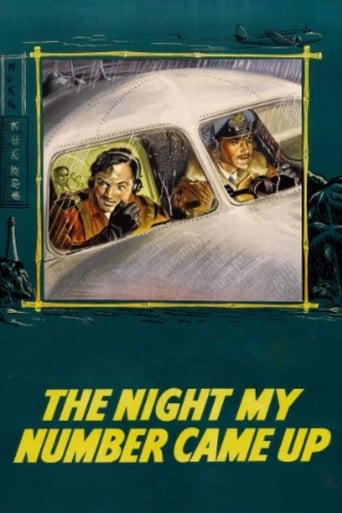malcolmgsw
It seems to me that in making this film they were trying to replicate past successes with The Halfway House and Dead of Night.Part of the problem with this film is because we are given the details of Michael Horse's dream at the beginning we know what is going to happen so there is not a great deal of suspense.It also seems as if the producers are giving the plane every conceivable problem.The radio fails,the cabin is not pressurised and there is no radar.It seems almost inconceivable that the plane would have no radar,and that the navigator was so incompetent that the aircraft would be flying around in circles.Entertaining but no classic.
JohnHowardReid
The major fault of this movie lies in the construction and conclusion of its story. If ever a film's story-line needed an unexpected twist, this picture is the number one contender. The plot hinges upon a dream that an airline passenger experienced. In the dream, the plane crashed. So, when the passenger actually boards the plane, events soon start to match the dream. The plot thus poses a simple question: Will the plane crash or will it not? A really on- the-ball director may have been able to make something of this repetitive narrative, but Leslie Norman is not that director. His background was in film editing too! So why he didn't make some effort to speed it up, is beyond me. Yet, I see the movie has received some excellent reviews. Maybe they were swayed by Rank publicity that the story was true. In any case, it would seem that many people obviously like a slow, repetitive approach with every point emphasized at least twice over. But frankly, I believe some of these enthusiasts are not actually reviewing the 94 minutes version at all. With commercial breaks, that version would certainly run for two hours on TV. Of course, it's possible that when broken up by commercials, the plot may not seem so repetitive. (Contemporary movies in which the emphasis is on speed, speed and more speed – and never mind logic – must drive them crazy).
Sturgeon54
On display is one of the greatest scenarios ever presented in film - a flight over the Orient of which an anonymous British officer has had a dream premonition of disaster. What is so great about this idea and how it was executed here is that the dream itself is simply a catalyst for a psychological probing of the behavior of the passengers once they learn one-by-one about the particulars of the dream and how these particulars are playing out in their real flight. The theme then becomes the old-as-Shakespeare literary idea of fate vs. free will, but the strength of the filmmakers is that it is never resolved conclusively in the end. Even when the characters do hint at not letting a particular passenger on board the plane because this passenger has been prophesized to be an integral part of the disaster, they take no serious action to remove him, instinctively realizing that even that may not give them greater control over the situation.The contrast of a modern technological artifice such as an aircraft with an archaic-style premonition is so brilliant because it portrays the ultimate paradox of human technological evolution: the farther human beings advance in their technological feats of control, paradoxically, the greater their lives are placed in the hands of the gods (fate) with all the many ways in which that technology can go tragically awry. For a simple idea, the filmmakers were obviously thinking, and they have added multiple layers to the story. "Night My Number Came Up" is a film I hope to see many times to pick up some themes I missed the first time. Like paintings, writing, and other forms of art, I believe that it is this characteristic which distinguishes great art from all the rest.
M. Dawkins
This has to be one of the few films to address the philosophical concept of predestination versus free will. Made by Ealing Studios (better known for their comedies) it follows a motley group of military officers, civil servants and others who are flying in a small passenger plane from Hong Kong to Tokyo. The night before the flight a naval officer relates a dream he had in which their plane was lost over the sea and eventually crashed on the coast. At first the travellers are amused and rather sceptical, but as the circumstances alter: planes are changed, passengers added - in line with the dream - they become more and more nervous. Then the storm clouds close in.This has to be one of the better British films of the fifties, as director Leslie Norman nicely builds up the tension notch by notch, allowing occasional respite as the main characters deliberate on superstition and rationality, fate and predestination, the power of dreams. Michael Redgrave is all cool rationality, Denholm Elliot repressed anxiety, and Alexander Knox the sceptic who becomes increasingly unhinged by fear, then philosophically resigned to the inevitable. It's a welcome addition to the list that will never make it as an in-flight movie. If you're nervous about flying, don't watch it.



